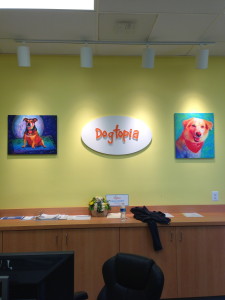I had always dismissed franchising as a business model until I began to be interested in Dogtopia, a dog day care franchise founded in the Washington DC area in 2002 by a young woman named Amy who worked in technology and didn’t have enough time to exercise her dog.
Leaving corporate life behind, Amy decided to open a place where dogs could come and play all day, like an indoor dog park–except at Dogtopia each dog had to be evaluated to be accepted, and the playrooms would be attended and monitored. When the first store grossed $1 million in its second year, Amy realized there was a good business opportunity here, and she decided to expand.
Ten years later, there are 25 Dogtopias scattered across the country. Twenty are franchises. Franchising is a tested model for growing a business, but it’s difficult to do well, because it depends on good processes, procedures, and people.
Peter Thomas, legendary franchise expert and chairman of TFS fell in “business love” with Amy last fall, and Thomas Franchise Solutions made an investment in Dogtopia. I’m a writer for TFS, and I followed the proceedings with more than passing interest because I had been interested in the pet industry for a decade myself– although as yet I had done nothing about it.
And that’s why, when TFS started helping Amy expand by adding more franchisees, I talked to my daughter about becoming partners in a store. Or maybe several. She was stunned. Me? A person who had started three companies and coached more than 700 entrepreneurs, invest in a franchise? Why?
We decided to start the due diligence, because of our mutual interest in the pet industry. Passion. That’s what started us along the road. But passion has to meet purpose for a business to exist. Our purpose was to be in business together, in a business that could be grown to where it could scale past just us and the available time we had in a day. (We’ve both been in businesses that depend on hourly fees and projects).
So we signed up for Dogtopia’s Discovery Day, a visit to the corporate office and surrounding Dogtopia sites so we could see what owners actually do.
The day began with two store visits, where we saw the layout of the facilities, the brand, the build-out, and the processes for enrolling and admitting a dog. The first site, which was in a busy shopping center, actually had valets who came out and got the dogs from the owners’ cars so no one had to park. We saw many dogs eagerly entering to see friends. The convenience and customer service was there. But that was just the surface. We also learned sanitary standards, feeding procedures, pack management, and how dogs are grouped and assigned to different playrooms that keep them safe.
At the second store, we were able to observe through webcams, just as the owners can while they’re at work. And of course there’s an app for that — both IOS and Android. The dogs are pretty captivating, because, they have lots of room to run around and wrestle, and there’s play equipment for the agility dogs. But there’s also a nap time, when they turn the lights down and encourage the dogs to sleep. We also saw the boarding facilities, which fill to capacity in August and December.
By the third site visit, we realized that the facilities were very similar to one another in both physical characteristics and how they treated the dogs. And that’s the good part. In a franchise, you are not going into business alone. You have the support of others who have been there before you and know how to help you avoid costly mistakes.
In the afternoon, we had presentations by the senior exec teams, telling us about employee training. hR processes, IT solutions, marketing support, and site selection. Dogtopia even offers executive coaching. The company turned itself inside out to answer questions and educate us.
I had never fully realized how much risk a good franchisor takes out of a startup, Dogtopia has made the process as turnkey as possible, but they know the success of a franchise is still dependent on the entrepreneur. They vet potential franchisees carefully, from management strengths to financial wherewithal, on the theory that a careful process going in minimizes risk on both sides — for the entrepreneur and the brand. A good franchisor knows that if you don’t succeed, neither do they.
After yesterday, I’d buy a franchise in a heartbeat.





